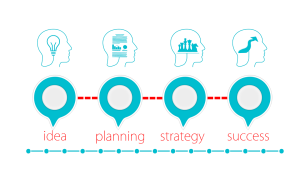For many people nowadays, career growth and career development are necessary for fulfilling personal and professional expectations.
They are necessary for anyone who strives to climb the corporate ladder, achieve set goals, and reach top-rated positions.
The desire to improve personal and professional perspectives has drastically increased within the last year, as the pandemic changed the way people developed professionally.
Many jobs were lost, yet, new career prospects emerged, enough to emphasize the importance of developing new skills, changing careers or jobs, getting hired, or being promoted.
Found on the professional crossroad, many people are looking for various ways to enhance their employability and develop their skills (read more on the job vs career).
In this article, we will distinguish career growth and career development and discuss different ways to increase your chances for promotion and success.
What is Career Growth?
What is career growth? Career growth in its essence means strategic effort to climb the corporate ladder, focusing on pre-established goals. It is quantitative, and it can be measured, i.e., you can see yourself going from a lower to a higher position.
But, career growth also includes aspects slightly different from just being promoted, i.e., it involves all the factors needed to reach the corporate summit.
These factors involve:
- Acquiring and utilizing new skills to help you gain professional achievement or recognition
- Being employed by an industry leader can provide opportunities for professional advancement. This is usually a reciprocal process since everything that you have acquired can be used to promote the company, develop new products or ideas, and/or make an impact.
- Having an opportunity to overcome challenges successfully, handle new responsibilities, recognize and work on breakthrough concepts, and stand for and defend major decisions.
Having said this, one could see career growth based solely on merits and the ability to prove oneself worth having a promotion and better position.
It means more responsibility, more personal involvement, and more reward. But, it could also depend on subjective opinions that might not always align with objective merits and achievements.
Corporate environments happen to be biased, and not anyone who deserves a promotion and a better position has the chance to get it.
Therefore, it is crucial to know how to make yourself visible to the management and how to make an impact that will eventually lead to getting a well-deserved position.
4 Ways to Take Charge of Your Career Growth
There’s nothing better than getting a well-deserved reward, particularly after working weeks or even years to get there.
But, more often than not, it doesn’t happen, or it is far from what you’ve hoped for, and it is annoying, frustrating, and even humiliating.
So, in order to avoid that scenario, you should know that there’s a way to get things moving the way you have imagined. The following four steps can help you get that long-awaited promotion or recognition.
Speak Up When an Opportunity Arises
We’ve often heard that patience is a virtue, and more or less, that’s a pearl of life wisdom.
However, when it comes to your career growth, you’ll need to know where and when you’ll draw a line between waiting for your managers to realize that you deserve something more and standing up for yourself.
If we lived in an ideal world, then we’d probably arm ourselves with virtues and wait to get our reward. But we don’t! So, some of the biggest corporate wisdom is to know how to take a stand for yourself.
You surely don’t have to take advantage of everything that gets along the way or try to diminish other team members. When the opportunity arises, just say that it is what you hope to get.
Make it clear that you strive for a higher position than the current one and that you are serious about giving your contribution to the company’s success.
If you don’t be open about your career expectations and don’t bring it forth to the management, they can’t see you as a serious candidate.
If there is competition for a higher position, consider what your advantage is over the other candidates, and make it clear when asked.
Emphasize any skills that you might have, but the management is not aware of and provides a vision of how you can make the company grow using your skills.
Remember, the management must be sure that you are ready to overtake more challenges and have the potential to tackle them successfully.
Speak Up Before an Opportunity Arises
What’s even more recommended is to state your career expectations even before any possibilities arise (learn more about career planning). There are different ways you could do this, depending on your role in the company and the status you have there.
You might have made that clear when you had your initial job interview or when your position was reviewed, but you must have realized that this information is usually ignored or seldom taken for granted.
Inform your manager that you are ready and willing to take up more responsibilities or that you expect to get that promotion.
It won’t hurt anyone if you deliver a monthly report of all your completed projects, including a note of your expectations.
However, be careful not to make yourself too imposing or rude in expressing your growth determination.
Find Out What Training You Need and Pursue It
If you have a specific position in mind, then find out what additional qualifications you’ll need for that job.
Sometimes, it takes mentorship from a more experienced person, so if there’s someone you can look up to, talk to that person and learn from him/her.
Never hesitate to ask questions and clear out everything that confuses you. First-hand learning is always best acquired when observed and guided.
Some jobs need additional qualifications to get them, such as MBAs or even getting a new degree.
Going back to school might scare you at first, but it is the only way to get the job you’ve always dreamt of. And nothing is too difficult if you truly want it, isn’t it?
Other career paths don’t impose academic achievements, so you should always know in advance what kind of development you need to be qualified for the desired position.
And finally, never underestimate experience and proficiency in doing a job, since they are valuable assets when applying for a new position.
Reach Out of Your Comfort Zone
We love our comfort zone. That’s why it is called the comfort zone first place. It’s like laying comfortably on your sofa doing nothing.
But, ask yourself: “Have you ever done anything substantial while being comfortable and relaxed?” Most likely, you haven’t, and that applies to your career development as well.
Getting out of your comfort zone means doing things that are either unfamiliar or challenging for you.
Things that you’d be struggling to do, things that will tempt you to give up, but that is the breaking point where your persistence and character strength will come to the surface.
If you are timid and withdrawn, try to make yourself visible by offering assistance, sharing new ideas, or doing extra work. Volunteer in projects that appeal to you and make valuable points to help teams grow.
Create business and personal relationships, and be friendly and helpful to your coworkers as their support and even recommendation can be invaluable at times.
Differences Between Career Growth and Development
Unlike career growth which is planned and strategic, career development is transformative, i.e., it defines all the changes that happen to you while you aspire to reach your goals.
Career development includes all the knowledge, skills, and experience you get as you move on the path of growth. It affects your personality, attitudes, the way you overcome challenges, and how you approach and tackle issues.
Career Growth FAQ
What Are the Types of Career Growth?
There 4 different types of career growth opportunities:
Knowledge-based – Requires theoretical and practical knowledge you’ve gained over the years.
Skill-based – Requires specific skills and abilities that you can gain and use to perform efficiently. These can be physical, technical, or service skills.
Entrepreneur-based – Requires the ability to work on your own and solve problems based on your independent creative thinking skills.
Freelance – Organizations and employers hire freelancers for specific jobs or projects. Typical freelancing jobs include graphic design, programming, copywriting, or marketing.
What is a Career Growth Opportunity?
If your career path provides a growth opportunity, it means that you can develop new skills, improve your abilities, and take part in new experiences in order to become a professional in your own field.
Career growth opportunities are key to job satisfaction, motivation, engagement, and, therefore, great job performance. It’s crucial for everyone who wants to advance in their careers and grow professionally.
Case Studies, Academic, and Research-Based Sources:
- “Career Development and Counseling: Putting Theory and Research to Work” by Brown, S.D., & Lent, R.W. (2013). John Wiley & Sons.
- “The Career Development Quarterly” by National Career Development Association.
- “The Impact of Career Development Interventions: A Synthesis of the Research” by Whiston, S.C., Sexton, T.L., & Lasoff, D.L. (1998). Journal of Counseling & Development.
- “Career Development in Organizations” by Greenhaus, J.H., Callanan, G.A., & Godshalk, V.M. (2010). Routledge.
- “The Boundaryless Career: A New Employment Principle for a New Organizational Era” by Arthur, M.B., & Rousseau, D.M. (1996). Oxford University Press.
- “Case Study: Career Development at Electronic Arts” by Harvard Business Review.
- “Professional Development and Career Success: The Role of Personal Learning Networks” by Rajagopal, K., Joosten-ten Brinke, D., Van Bruggen, J., & Sloep, P.B. (2012). European Journal of Training and Development.








